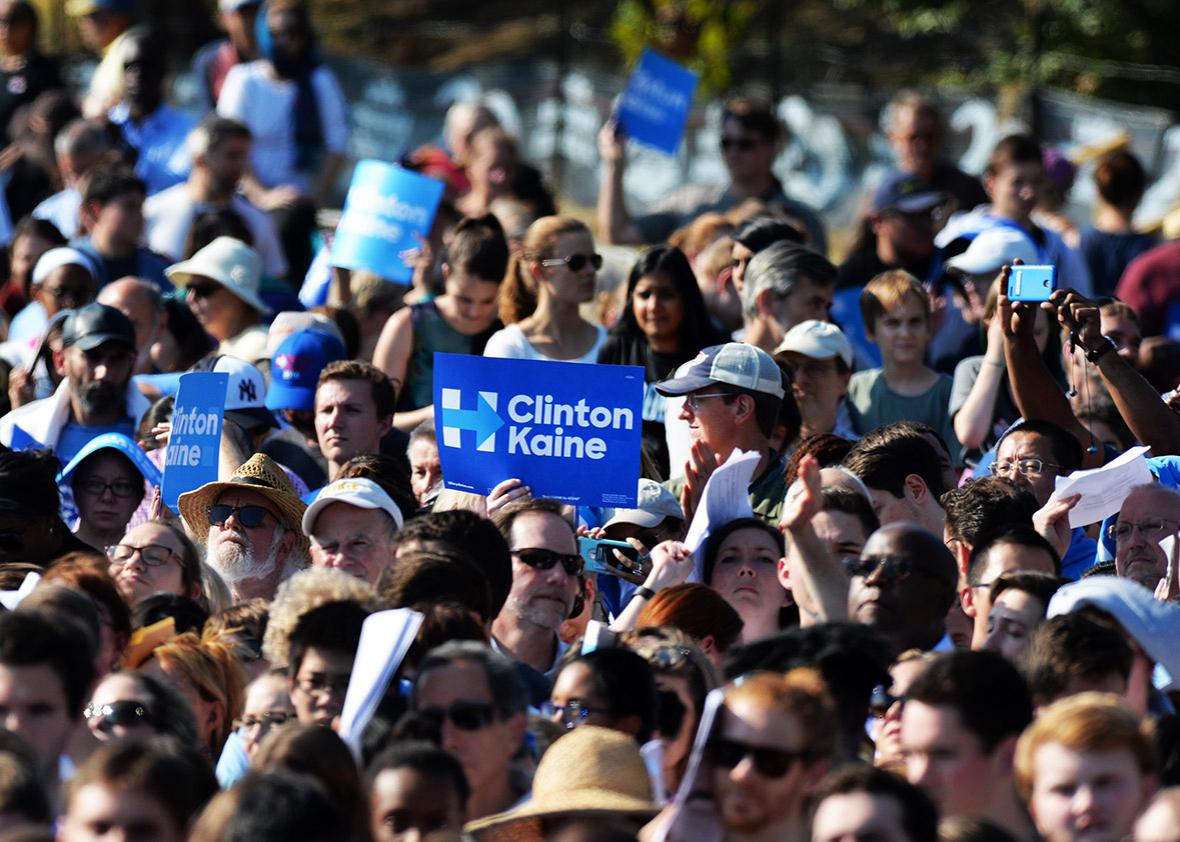CHAPEL HILL, North Carolina—We know what Donald Trump’s voters think. Journalists have spent the past year plumbing the depths of their feelings, extracting their views of the country and where it stands. Trump backers are “angry.” They’re “frustrated.” They’re looking for a radical change to the status quo.
By contrast, the press has spent less time speaking to voters for Hillary Clinton, despite the fact that she has received the most support of any candidate this year and will serve—if she wins—as the first female president of the United States. There are good reasons for this: Trump is a novel candidate, which makes him and his backers a natural locus for attention. Still, there’s an oversight here. And it’s with that oversight in mind that I’ve spent the past week in North Carolina speaking to Clinton supporters at early voting events held throughout the state.
On Tuesday, for instance, a modest crowd of Clinton backers packed into a community gymnasium in Charlotte to hear Vice President Joe Biden, with introductions from Roy Cooper and Deborah Ross, the Democratic nominees for governor and Senate, respectively. Sabir Majumder is a longtime Democrat who migrated from Bangladesh to the United States 30 years ago. He voted early but came to the Biden event to talk to other Democrats and take in the boisterous atmosphere of an election-year rally. He supports Clinton, but not without familiar misgivings. “Classified information is classified and it has to be treated really well,” he said, speaking about Clinton’s emails and recent FBI revelations. “I don’t know everything, but the way I look at it, it may be problematic. Still, I support her because of bigger issues. I might have looked at it differently if there was a better candidate, but there is none. There is none. So, I have to pick one.”
Gwen Jenkins moved to North Carolina from California and has lived in the area for eight years. Like many Americans, she is dismayed by the tone and tenor of the election. “I am very, very saddened by the degradation that has happened in the campaign, just in all of the nastiness and negativity,” she said. Despite attending a rally for early voting, Jenkins hasn’t cast a ballot yet. But she will, on Election Day proper: “I find joy in the day of voting. I will stand in the long line with my husband and wait on the polls to open.” And it’s worth saying that Jenkins, an older black woman, doesn’t know a single person who voted in 2012 but who doesn’t plan to vote this year. “The people that I know are excited to vote,” she said.
On Wednesday, President Obama held a massive rally for Clinton at the University of North Carolina in Chapel Hill. Thousands of people crowded on to the university’s intramural fields to hear Obama stump for his prospective successor, in what very well may be his final visit to the state as president. He was feisty, and the crowd responded in kind, with constant clapping, cheers, and excitement. His message, however, was stark. “All the progress we hope to make over the next eight years, all of that goes out of the window if we don’t win this election. And we don’t win this election, potentially, if we don’t win North Carolina,” Obama said. “So I hate to put a little pressure on you, but the fate of the republic rests on your shoulders. The fate of the world is teetering and you, North Carolina, are going to have to make sure that we push it in the right direction.”
Like Tim Kaine did during his stop in the state, Obama stressed Republican-led attacks on the voting rights of black voters. “A federal judge said that, based on the evidence, those who voted for these laws targeted black voters with, and I’m quoting, ‘surgical precision.’ Here, in North Carolina,” stressed the president. “The list of voters the Republicans tried to purge was two-thirds black. That was not an accident,” he said. Obama then tied this to a longer history of racism, describing poll taxes and literacy tests with the refrain “it wasn’t that long ago.”
When I spoke to black voters at the event, they also emphasized the role of racism in shaping this election year. “I think people are nervous about the direction we’re heading in with so many minority groups rising up, taking on corporate positions, political positions,” said Constance Martinez, an auditor who lives in the area. “They think America is going to be snatched from underneath them.”
Marcel Jaff is an immigrant from Cameroon who says he was motivated to vote early after seeing that President Obama had done the same. This is his third election since becoming a citizen, and he has paid close attention to every twist and turn in the race. Jaff too sees racism as the key factor. “It just seems to me that there is some kind of a backlash,” he said. “And you can’t deny that it has to do with race.”
The popular narrative of this election is that it represents a rising nationalist tide in American politics. And that’s true, although this nationalism is shaped and defined by white identity and white racism. But there’s another side to that story, revealed in conversations with voters of color. For them, this election is one where they assert their place in the United States—where they say that this is their country too.
“They aren’t losing anything,” said Martinez of Trump voters. “They are gaining so much more. As a united people we are so much more than we are divided. I hope this election shows them that they have nothing to fear. That we are one country and we are moving toward one people.”
